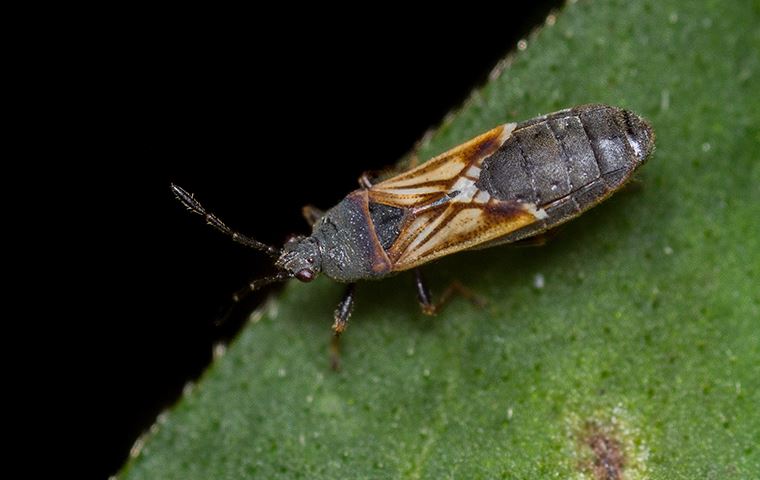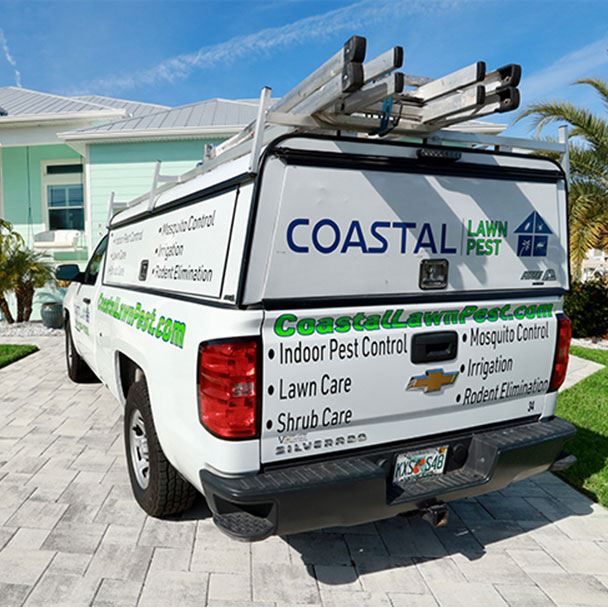
Chinch Bug & Grub Identification & Prevention
Frequently Asked Questions About Chinch Bugs & Grubs
What Are Chinch Bugs & Grubs?

Chinch bugs and grubs are two types of bugs that invade Cape Coral lawns and cause unsightly damage.
Below is a brief description of these lawn-damaging insects.
Chinch bugs adults have a dark red to black body that is less than ¼ inch long. They have white wings and a white dot on their back. Their nymphs are bright red and have a white band across the abdomen. Both the adults and nymphs produce a strong odor that is most noticeable when these pests are crushed, or a large population is present.
The term "grub" describes the larvae of several species of beetles. Grubs have distinctive white or cream bodies, brown heads, and C-shape. These pests live primarily out of our sight; therefore, the damage they cause to our lawns is typically the first indicator that a grub infestation is present. Reach out to us today for pest and lawn care services in Cape Coral!
Are Chinch Bugs & Grubs Dangerous?
Both chinch bugs and grubs are considered dangerous because of the large amount of damage they can cause to our lawns.
Chinch bugs use specialized sucking mouthparts to remove sap from grass or other plants. As they feed the crowns and stems of grass, they inject it with a toxin that prevents the plant from being able to transport water and nutrients from the soil.
Grubs live in the soil and feed on the root systems of grass and other plants. Patches of brown or wilted grass are signs that grubs may use your lawn as a place to feed. Additionally, many wild animals and birds like to eat grubs. They will dig up your lawn to feed on the grubs.
Why Do I Have a Chinch Bug & Grub Problem?

Why Choose Coastal Lawn and Pest?
-
Fully Customizable Services for Your HomeNo two properties should be looked at in the same way, and neither should their pest control or lawn care services. Coastal Lawn and Pest offers tailor-made solutions to address problems of any size, caliber, or seriousness.
-
Hand-Picked Service TechniciansThe team at Coastal Lawn and Pest believes the most important part of lawn and pest control is great customer service. That’s why we employ some of the most skilled pest control experts in Southwest Florida — and match skilled service technicians to every and any need.
-
Comprehensive & Integrated ServiceWe are a one-stop shop for all your property management needs, ranging from lawn fertilization to tree and shrub maintenance to pest control and elimination. We’ve served home and business owners with outstanding services since 2001 (and counting).
How Do I Get Rid of Chinch Bugs & Grubs?
When it comes to chinch bugs and grubs, being proactive and partnering with a lawn care specialist is best. Coastal Lawn and Pest offers lawn care and turf damage insect control to keep these pests from taking over your yard. Our services are designed to meet the unique needs of property owners living in Cape Coral and surrounding areas. We will work with you to determine which of our home lawn care & pest control services will offer the best results for your property. Contact us today and learn about our lawn pest control offerings.
How Can I Prevent Chinch Bugs & Grubs in the Future?
Use the following helpful tips to prevent problems with chinch bugs and grubs on your Florida property:
- Don’t mow your lawn too short; beetles don’t like laying eggs in tall grass.
- Because chinch bugs prefer dry soil, don’t underwater your lawn.
- Keep your lawn well fertilized. Healthy lawns are better equipped to defend themselves against lawn pests.
Call today and speak with one of our helpful experts for more information about these lawn pests, including how to control them.


What Our Customers Are Saying
-
It been a pleasure working with Coastal for just over a year. Our lawn has never looked better and all the techs are knowledgeable and personable.- Charles D.
-
“Jenny, the technician arrived and explained the condition of my lawn. She was very knowledgeable and took the time to explain the treatment for my yard during this visit.”- Linda Q.
-
“Highly interactive with questions and explanations. Always friendly, and they remind of upcoming visits.”- Roy R.
-
Coastal Lawn and Pest's Blog
View Our Blogs & Resources
Want all the latest news or updates? Browse through our blog to read our most recent posts and featured articles.

